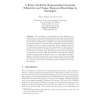204 search results - page 13 / 41 » Temporal Representation and Reasoning for the Semantic Web |
HT
2006
ACM
15 years 7 months ago
2006
ACM
Metadata attempts to describe the content, format, purpose and structure of data. Over the past few years, the IEEE-LOM standard has dominated the metadata world in e-learning app...
115
click to vote
COOPIS
2003
IEEE
15 years 7 months ago
2003
IEEE
Abstract. Time modeling is a crucial feature in many application domains. However, temporal information often is not crisp, but is uncertain, subjective and vague. This is particul...
150
click to vote
FLAIRS
2009
14 years 11 months ago
2009
Ensuring the consistency and completeness of Semantic Web ontologies is practically impossible, because of their scale and highly dynamic nature. Many web applications, therefore,...
106
click to vote
OWLED
2007
15 years 3 months ago
2007
The use of background knowledge and the adoption of Horn clausal logic as a knowledge representation and reasoning framework are the distinguishing features of Inductive Logic Prog...
122
click to vote
JUCS
2010
15 years 10 days ago
2010
: In the paper application of semantic wikis as knowledge engineering tool in a collaborative environment is considered. Selected aspects of semantic wikis are discussed. The main ...

